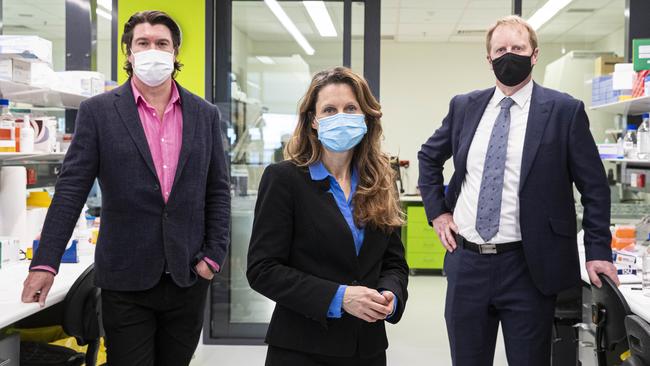Australian breakthrough promises to tear down cancer ‘shield’
Scientists have invented a drug they hope could be a ‘game-changer’ for the treatment of pancreatic cancer.

Scientists have invented a drug they hope could be a “game-changer” for the treatment of pancreatic cancer by breaking down a fibrous “shield” around cancer cells that makes them resistant to treatment.
The drug, known as AMP945, is set to be trialled on humans in a rare example in Australia of a therapeutic invented in the laboratory progressing to clinical trials on home soil. The drug targets a protein called focal adhesion kinase (FAK) that controls the formation of fibrotic tissue in the body. Fibrosis is the development of fibrous connective tissue. In fibrotic diseases and fibrotic cancers such as pancreatic and ovarian cancers, fibrosis leads to the development of a “fibrotic tissue shield” that protects cancer cells from penetration by immune system cells or chemotherapy drugs.
AMP945 has been shown in preclinical testing to act on FAK, potentially enabling it to both treat and prevent fibrotic diseases, as well as make cancers that were previously resistant to treatment responsive to drugs.
John Lambert, CEO of Melbourne biotechnology company Amplia Therapeutics which is commercialising AMP945, said drugs currently used to treat pancreatic cancer were often ineffective because of the fibrotic shield.
“We hope that by targeting FAK we can remove that shield and allow these cancer drugs to land the blow they were designed to deliver,” he said.
Cancer Australia is formulating a roadmap for pancreatic cancer that it is hoped will be the first step on the road to improving survival rates. Pancreatic cancer has a five-year survival rate of just 11 per cent. Four in five people with pancreatic cancer die within 12 months of diagnosis.
AMP945 was invented by scientists working in collaboration with the Cancer Therapeutics Co-operative Research Centre, which was set up by the federal government in 2007 to bridge the gap between research breakthroughs and commercialisation.
Cancer Therapeutics CRC acting CEO Lisa Dube said the discovery of AMP945 and its progression into clinical trials was unusual. “It’s very rare for drugs that have been developed in Australia to then go on to clinical trials in Australia,” she said. “The collaborative structure of the CRC has been such a big success and this shows us what happens when our leading research institutes are given the means and resources to collaborate.”
The Cancer Therapeutics CRC has received $71m from the federal government over the past 13 years and has recently signed preclinical deals for two of its other drugs with pharmaceutical giants Pfizer and Merck.
The phase 1 human study of AMP945 will be a randomised, placebo-controlled clinical trial to evaluate the safety and tolerability of the drug in 64 healthy volunteers. Pharmacokinetics, or how AMP945 is absorbed, will also be assessed.
Amplia Therapeutics expects to complete dosing in the trial during the first half of next year, with results due to be published mid-2021.
If the phase 1 trial is successful, phase 2 clinical testing that will assess the efficacy of the drug will proceed late next year.
■ Volunteers wishing to be part of the phase 1 clinical trial of AMP945 can express their interest here.





To join the conversation, please log in. Don't have an account? Register
Join the conversation, you are commenting as Logout